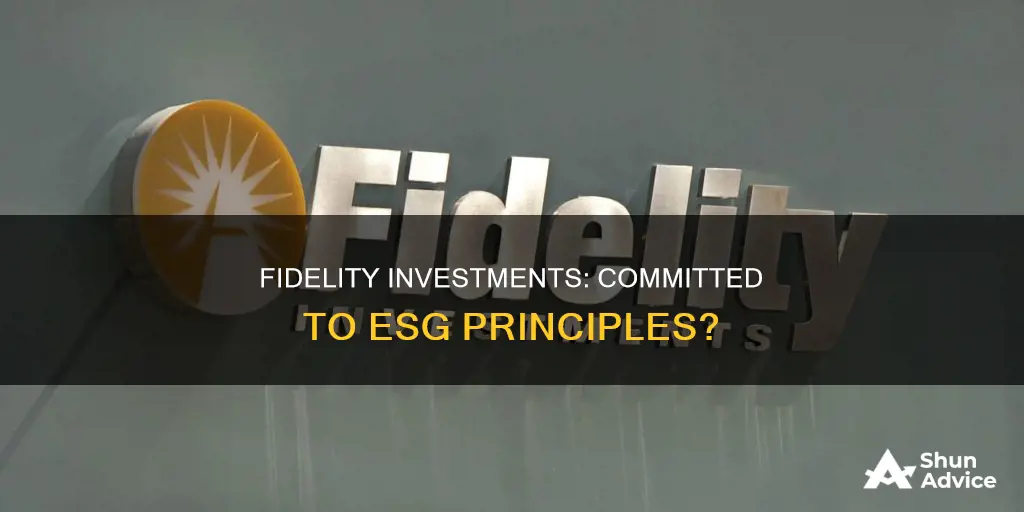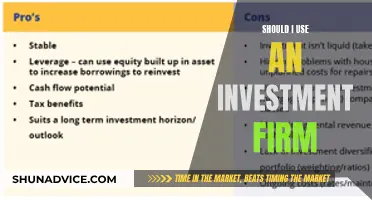
Fidelity Investments offers a wide range of investment options, including sustainable investing funds that consider Environmental, Social, and Governance (ESG) factors. These funds aim to align investors' financial goals with their sustainability values by investing in companies that demonstrate sustainable and ethical practices. Fidelity's sustainable funds include both thematic and broad-based approaches, allowing investors to choose funds that align with their specific interests and values. The company utilizes its proprietary ESG ratings frameworks and third-party ESG ratings to evaluate companies' sustainable business practices and make investment decisions. With a commitment to helping clients meet their financial objectives and sustainability goals, Fidelity offers a diverse set of funds backed by decades of research and investment expertise in the field of sustainable investing.
| Characteristics | Values |
|---|---|
| Environmental factors | Efficiently steward environmental resources, including the risks and opportunities they pose to a company’s long-term success |
| Social factors | Prioritize the well-being of employees, suppliers, communities, and customers impacted by company business operations |
| Governance factors | Emphasize the effective management of company strategy, structure, operations, and internal processes, as critical drivers of investment value |
What You'll Learn

Fidelity's ESG funds and sustainable investing
Fidelity offers a wide range of investment options for customers interested in sustainable investing. Their sustainable investing strategies consider financially material and relevant environmental, social, and governance (ESG) factors in the investment research and decision-making process. Fidelity believes that these factors can be critical to an investment's long-term value.
Fidelity's sustainable investing strategies are underpinned by their core principles, which include putting customers' long-term interests first and investing in companies that align with their approach to creating long-term value. Their differentiated investing process is supported by collaborative proprietary sustainable investment research across asset classes.
Fidelity offers both broad-based and thematic sustainable investing options. Broad-based investing strategies consider a wide range of ESG factors, while thematic investing focuses on companies that align with specific sustainability themes.
Broad-Based Sustainable Investing Options:
- Fidelity® Sustainable Core Plus Bond Fund (FIAEX): Provides exposure to debt securities believed to have positive ESG benefits.
- Fidelity® Sustainable Low Duration Bond Fund (FAPGX): Provides exposure to shorter-maturity investment-grade debt securities with positive ESG benefits.
- Fidelity® Sustainable Intermediate Municipal Income Fund (FSIKX): Provides exposure to investment-grade municipal debt securities with positive ESG benefits.
- Fidelity® Sustainable International Equity Fund (FSYRX): Provides exposure to developed market companies with robust ESG practices while seeking long-term growth.
- Fidelity® Sustainable Emerging Markets Equity Fund (FSYJX): Provides exposure to emerging market companies with an attractive ESG profile, aiming to provide value while minimizing risk.
- Fidelity® Sustainable Multi-Asset Fund (FYMRX): Combines Fidelity's expertise in asset allocation, stock selection, and ESG integration to offer a diversified portfolio focused on long-term growth through sustainable securities.
- Fidelity® Sustainable U.S. Equity Fund (FSEBX): Evaluates companies' ESG profiles to provide insights into current and future sustainable leaders.
- Fidelity® U.S. Sustainability Index Fund (FITLX): Tracks a domestic stock benchmark targeting companies with high ESG ratings while maintaining broad market exposure.
- Fidelity® Sustainability Bond Index Fund (FNDSX): Tracks a benchmark of investment-grade government, corporate, and asset-backed securities from issuers with strong sustainability profiles.
- Fidelity® International Sustainability Index Fund (FNIDX): Tracks an international stock benchmark targeting companies with high ESG ratings while maintaining broad market exposure.
- Fidelity® Sustainable Core Plus Bond ETF (FSBD): Provides exposure to debt securities believed to have positive ESG benefits.
- Fidelity® Sustainable Low Duration Bond ETF (FSLD): Provides exposure to shorter-maturity investment-grade debt securities with positive ESG benefits.
- Fidelity® Sustainable High Yield ETF (FSYD): Actively managed, seeking a high level of income through core exposure to high-yield bonds with high ESG ratings.
- Fidelity® Sustainable U.S. Equity ETF (FSST): Actively managed, evaluating companies' ESG profiles to identify current and future sustainable leaders.
Thematic Sustainable Investing Options:
- Fidelity® Healthy Future Fund (FAPHX): Invests in companies working to improve life expectancy, enhance people's lives, and reduce negative environmental impacts.
- Fidelity® Climate Action Fund (FCAEX): Invests in companies actively addressing climate change by removing, reducing, or mitigating its effects.
- Fidelity® Water Sustainability Fund (FLOWX): Invests in companies ensuring safe, reliable, and accessible water delivery.
- Fidelity® Environmental Bond Fund (FFEBX): Invests in the debt of companies and projects that recognize, disclose, and reduce environmental risks.
- Fidelity® Women's Leadership Fund (FWOMX): Invests in companies that prioritize and advance women's leadership and development.
- Fidelity® Environment & Alternative Energy Fund (FSLEX): Focuses on alternative and renewable energy, energy efficiency, pollution control, water infrastructure, and other environmental support services.
- Fidelity® Clean Energy ETF (FRNW): Invests in companies involved in the production of energy from renewable sources like solar, wind, and hydrogen.
- Fidelity® Women's Leadership ETF (FDWM): Actively managed, investing in companies that prioritize and advance women's leadership.
Understanding Investment Cash Flows Over Time
You may want to see also

ESG criteria and investment strategies
Environmental, Social, and Governance (ESG) criteria are used to evaluate the impact of a company's operations on the environment, its relationships with internal and external stakeholders, and its leadership, ethics, and management.
Environmental Criteria
Environmental criteria gauge a company's impact on the environment, including its contributions to climate change, carbon footprint, water use, resource conservation, pollutants, and clean technology use. It also involves a company's efforts to address climate change, such as the use of renewable energy, resource conservation, pollution reduction, and reduced carbon footprints.
Social Criteria
The social criteria examine a company's relationships with its employees, suppliers, customers, and communities. It involves evaluating workplace conditions, health and safety of employees, diversity and inclusion, community engagement, and social initiatives.
Governance Criteria
Governance criteria refer to a company's leadership, ethics, and management practices. This includes board diversity and independence, executive compensation, transparency, anti-corruption policies, and shareholder rights. It also involves ensuring accurate and transparent accounting methods, pursuing integrity in leadership selection, and accountability to shareholders.
Investment Strategies
There are several investment strategies that incorporate ESG criteria:
- Negative Screening: Excluding specific companies or sectors that do not meet certain ESG criteria or goals, such as excluding fossil fuel companies to decrease the impact of climate change.
- Positive Screening: Selecting a subset of top-performing companies within a defined industry based on specific ESG performance measures or criteria.
- Portfolio Tilt Strategy: "Tilting" the percentage of ESG investments in a portfolio to be higher than non-ESG investments while maintaining sector weights that match a target index.
- ESG Integration: Embedding ESG considerations into a firm's existing investment process, treating it as another factor that can provide returns.
- Shareholder Action: Encouraging companies that investors have invested in to pursue material ESG opportunities.
- Activist Investing: Buying equity in a company to influence and change its operations and ESG strategies.
- Sustainability-Themed Investing: Identifying one issue relating to sustainability and investing in indexes of companies that address that specific issue.
These strategies allow investors to create portfolios that provide both financial returns and a positive impact on society and the environment.
Flip Cash Investment: Legit or Scam?
You may want to see also

ESG research and stewardship initiatives
Fidelity's approach to sustainable investing is underpinned by deep proprietary research and disciplined investing principles. The company's commitment to its customers' long-term interests and value creation is central to its investing and stewardship activities.
Fidelity's differentiated investing process is supported by collaborative proprietary ESG research across asset classes. The company engages with issuers as part of its ESG research and stewardship initiatives. This cross-asset class collaboration enables Fidelity to offer a diverse set of funds, backed by decades of research and investment expertise.
Fidelity's active sustainable funds prioritize one or more ESG factors in their fundamental research and investment disciplines. The company's sustainable investment research engine is enhanced by its size and scale, enabling it to help customers meet their financial objectives and sustainability goals.
Fidelity has also joined several external organizations to promote sustainable investing and support ESG transparency. The company's commitment to ESG transparency is further demonstrated by its publication of Stewardship Principles, Proxy Voting Guidelines, and voting results.
Fidelity's sustainable investing strategies offer exposure to environmental and social investment themes. These include the transition to clean energy sources, the advancement of women's leadership and development, and the focus on equitable relationships with customers, employees, suppliers, and communities.
Cashing Out Your SoFi Investment: A Step-by-Step Guide
You may want to see also

ESG-focused funds and ETFs
Fidelity Investments offers a range of ESG-focused funds and ETFs for customers who want to align their investments with their sustainability goals. These funds and ETFs are backed by decades of research and investment expertise, and they consider financially material environmental, social, and governance (ESG) factors in the investment research and decision-making process.
Thematic Sustainable Investing Funds
- Fidelity® Healthy Future Fund (FAPHX): Invests in companies working to improve life expectancy, enhance people's lives, and decrease negative environmental impacts.
- Fidelity® Climate Action Fund (FCAEX): Invests in companies that are working to remove, reduce, or mitigate the effects of climate change.
- Fidelity® Water Sustainability Fund (FLOWX): Invests in companies helping to deliver safe, reliable, and easily accessible water.
- Fidelity® Environmental Bond Fund (FFEBX): Invests in the debt of companies and projects that are recognizing, disclosing, and reducing environmental risk.
- Fidelity® Women's Leadership Fund (FWOMX): Invests in companies that prioritize and advance women’s leadership and development.
- Fidelity® Environment & Alternative Energy Fund (FSLEX): Focuses on alternative and renewable energy, energy efficiency, pollution control, water infrastructure, waste and recycling technologies, or other environmental support services.
Actively Managed ETFs
- Fidelity® Clean Energy ETF (FRNW): Invests in companies that distribute, produce, or provide technology or equipment to support the production of energy from solar, wind, hydrogen, and other renewable resources.
- Fidelity® Women's Leadership ETF (FDWM): Invests in companies that prioritize and advance women's leadership.
It is important to note that the actively managed ETFs mentioned above differ from traditional ETFs in their level of information disclosure, which may create additional risks and impact trading costs.
Fidelity® Sustainable Target Date Funds
Fidelity® Sustainable Target Date Funds: A single-fund investment option that adjusts over time based on an investor's target retirement date, providing a mix of sustainable assets and growth potential while helping to reduce risk.
Fidelity's commitment to sustainable investing is reflected in its core principles, which prioritize customers' long-term interests and investing in companies that align with their approach to creating long-term value.
Investing Cash Flow: Exploring Other Items
You may want to see also

ESG and sustainable investing tips
ESG stands for Environmental, Social, and Governance criteria, which are used to evaluate a company's sustainability and responsibility. ESG investing is a form of sustainable investing that considers these factors to judge an investment's financial returns and overall impact.
Environmental Factors
These include a company's conservation efforts, green energy initiatives, and their impact on air and water pollution.
Social Factors
These examine how a company treats people, both inside and outside the organisation. This includes employee gender and diversity, customer satisfaction, workplace conditions, and the company's relationships with its suppliers, customers, employees, and the communities it operates in.
Governance Factors
These consider how a company is run, including leadership, executive pay, audits, internal controls, and shareholder rights. Governance factors also ensure a company uses accurate and transparent accounting methods and pursues integrity and diversity in its leadership.
Tips for ESG and Sustainable Investing:
- Understand the Basics: Familiarise yourself with the ESG criteria and how they are applied to evaluate companies.
- Research and Evaluate: Utilise independent research firms like Morningstar to review how companies or funds score in terms of ESG factors. You can also refer to third-party sites like Glassdoor to assess a company's work environment.
- Consider Your Values: Identify your personal values and priorities. ESG covers a broad range of issues, so determine which specific areas are most important to you and seek out investments that align with those beliefs.
- Diversify Your Portfolio: Consider investing in a variety of ESG funds to quickly build a well-rounded portfolio. Look for funds that focus on specific issues you care about, such as green energy.
- Robo-Advisors: If you want help building an ESG portfolio, consider using robo-advisors like Betterment and Wealthfront, which offer socially responsible investment portfolios.
- Evaluate Funds: When choosing a fund, review the prospectus to understand the specific companies the fund invests in, along with other details like expense ratios.
- Stock Options: If you prefer investing in individual stocks, look for companies that offer impact reports detailing their sustainable and cultural initiatives.
By following these tips, you can make informed decisions about ESG and sustainable investing, ensuring your investments align with your values and financial goals.
EM Cash: Investing Strategies for Beginners
You may want to see also
Frequently asked questions
ESG stands for Environmental, Social and Governance. It involves evaluating and analysing these factors as part of the investment research and decision-making process.
Yes, Fidelity Investments uses ESG in its sustainable investing strategies. They offer both active and passive broad sustainable- and thematic-focused investment options across asset classes.
ESG investing allows investors to align their portfolios with their sustainability goals. It also enables investors to evaluate the management and policies of the companies they are investing in.
Fidelity offers a range of ESG funds, including the Fidelity® Healthy Future Fund, the Fidelity® Climate Action Fund, the Fidelity® Water Sustainability Fund, and the Fidelity® Women's Leadership Fund.







